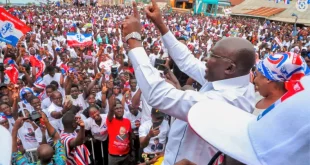Ghanaians have been asked by the ruling New Patriotic Party (NPP) to commend President Nana Addo Dankwa Akufo-Addo and his administration for putting policies in place to address the country’s economic problems.
The economy of the nation has been in trouble for the previous six months, with inflation reaching a peak of 50.3% and the cedi losing value, making life tough for many Ghanaians.
Nearly a month ago, the cedi was weaker than other major currencies, notably the dollar (GH15 to $1), but it is currently strengthening and is almost at GH10 to $1.
At a news conference on December 21, 2022, NPP General Secretary Justin Frimpong Kodua expressed optimism that the government’s current initiatives will continue to be successful and provide relief for Ghanaians.
“So we ask if the government can be blamed for the cedi depreciation, why can’t this same government be credited for the appreciation of the cedi? We leave that to the judgment of discerning Ghanaians. We also find it gratifying that owing to the massive appreciation of the cedi, prices of petroleum products at the pump have reduced resulting in a 15.3 reduction in transport fares as announced by transport unions.
“Although these developments may not entirely address the prevailing socio-economic conditions in the country, we do believe strongly that they may offer a sigh of relief for Ghanaians as we approach the festive season.”
He also pleaded with business owners and other industrialists on the NPP’s behalf to lower their prices in order to lessen the suffering of the populace.
“We request that all producers and dealers lower the cost of goods to reflect this reality.”
The government revealed last week that it had reached a staff-level agreement with the IMF on economic policies and reforms that would be supported by a new, three-year Extended Credit Facility (ECF) arrangement worth about US$3 billion.
The authorities’ comprehensive reform plan aims to establish the groundwork for a robust and inclusive recovery while safeguarding the weak, preserving financial stability, and restoring macroeconomic stability and debt sustainability.
Source: Ghanatodayonline.com
 Ghanatodayonline.com News, Politics, Health, Education & More
Ghanatodayonline.com News, Politics, Health, Education & More



